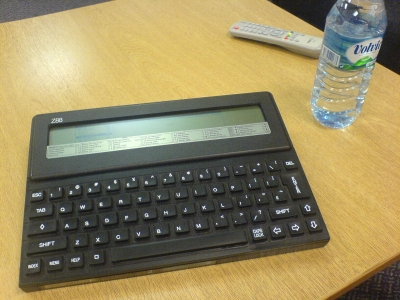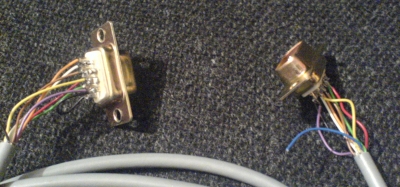Sir Clive has always been into portable devices. You’ve only got to look at, well, anything he’s ever done. From the matchbox-sized television to the foldaway A-Bike, everything’s been small. But while his computers have always been easy to move around, only one was truly portable – the Z88.
 The original ad was going to have Sir Clive jumping over it, but it wasn’t quite as impressive as it should have been. |
Sinclair’s final computer, the Z88 was built after the Amstrad buy-out, and so wasn’t allowed to bear the Sinclair Research name. Instead, it’s a Cambridge Computers device. Of course, what’s in a name? You’ve only got to look at it to see that it’s one of Sinclair’s babies. The stylish black case, the rubber keys – nobody else would make such a tiny computer this, well, cool.
Strangely, and unlike the PC200 that was released the same year, the Z88 isn’t just a machine that looks good. It’s also quite usable too. It was always intended to be a business machine, so it comes with a mini-office package called Pipedream built into the ROM. It takes a few minutes to get used to the essential keyboard shortcuts, but once you have, Pipedream is a very handy little word-processor. In fact, I’m writing this article using it right now, putting myself in the company of Arthur C. Clarke and Douglas Adams. (Mr Clarke has two, apparently. Jammy bugger.)
 If only there was some way to upload this photo from the Z88 too – then I could abandon my PC forever! (Possibly.) |
The only real problem with using the Z88, of course, is getting all your files from the rubber wonder into something more grown-up like a PC. The only media that goes into the machine are EPROM cartridges, which are inordinately expensive (or not, considering how old and obscure this particular technology is). There are a few options – you can buy a link cable, buy a whole package (which includes a fancy pants ROM cartridge, but is very expensive) or you can break out the soldering iron, rig up your own link cable and get some free software to handle the PC end of things. (Guess who went for the cheapest option…)
 It took me four attempts to get it to this point. My ‘build my own Speccy’ plan has been postponed indefinitely. |
The Z88 doesn’t have as wide a range of software available as its older brother, but there is still a surprising amount out there. Unfortunately ROM cartridges remain as expensive as they were twenty years ago, but once you’ve got a link cable you can still get a decent amount into the system’s RAM (especially if you’ve got a RAM pack). There are even games available, such as Dominic Morris’s port of the immortal Jet Set Willy.
The Z88 is a pretty uncommon machine, but there are still places you can pick them up. Ebay is a good start, and is how I got mine (for a mere £25, including postage and a very handy (albeit bright red) custom carrying case!). Of course, mine has a tear around the D key so it’s not perfect. For a perfect Z88, Rakewell are the people to talk to, but the price will be significantly higher. You get what you pay for, though, and while mine came with a 128K RAM pack and Spellmaster, yours could come with a lot more – bigger RAM packs and EPROM packs (for ‘real’ storage, rather than the battery-backed RAM storage) are available, as are rather mains adapters.
Even without a mains adapter, however, the Z88 is far from useless. While your average PC will last four or five hours on a huge, weighty custom power-pack, the Z88 will last for a claimed twenty hours actual computing, and effectively indefinitely on stand-by, all on four standard AA batteries. It’s also got a capacitor that will keep the contents of its RAM-based file system intact for a few minutes while you’re changing the batteries.
There are pretty much no drawbacks to owning this machine. As a portable word-processor, it’s fantastic. I can’t comment on its usability as an ‘organiser’, because I don’t lead the kind of lifestyle that requires one. (I tried it for a couple of days anyway, but ‘show up to work’ and ‘go home to sleep’ don’t really demand diary entries.) The expensive nature of ROM storage is a bit of a pain, but I live in hope of an adaptor for USB flash sticks being developed. (Not that I’d know what to do with half a gig of storage space anyway – that sort of space’d hold the next forty years worth of copy for YS3.)
Overall, it’s a beautiful machine that not only should be on your list if you’re a collector, but also if you’re looking for a small, lightweight usable computer.

Nice. It could be argued the z88 was Sinclair’s best machine. The others were either good in the “wrong” way (the Speccy was never meant to be the UK’s finest games console, for example), or not really as good as they should have been, being crippled by some daft design decision or twelve (*cough*QL). The z88 though, as you say, just does the job. Really rather well.
Hurrah for Uncle SIr Clive! Finally he got it right, and then gave up. That’s the spirit that built the Empire! (Actually, it’s more like the spirit that ended the Empire, but that was good, too; look at the mess France got into with theirs, eh?)
One Trainspotter Award application, though: isn’t it “Cambridge Computer”, without the “s”, same as Apple?
A few factoids:
* The Z88 was a Sinclair Research product! After the Amstrad buyout, SirC realised that selling risky products as part of Sinclair Research in turn put Sinclair Research itself at risk. So, after the Amstrad buyout a new strategy was initiated: products would be developed by Sinclair Research and, should any get to a commercial stage, a new company is spun-off with Sinclair Research as whole- or part-owners so that, this time around, Sinclair Research is insulated from any business disasters. Cambridge Computer was the first of these spin-offs – can’t remember if it was 100% owned by SR or a joint venture with someone else. The strategy still exists to this day.
* The Z88 was, naturally, released in 1987. Hence the name. Cough.
Er, it is Cambridge Computer. It’s those rubber keys, honestly. And I’m afraid I’ll have to deny you your Trainspotter owing to the missing apostrophe in “theirs” in your application. (Phew!)
And as for the year of release, well, you can’t expect me to go to such strenuous levels of research as turning the computer over…